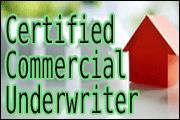Commercial Loan Training
Best-Selling Training Courses:
Instructor-Led: Webinars
Online Training Courses
About Commercial Mortgages
What Are Commercial Mortgages?Commercial mortgages are primarily used for buying land or property for business purposes.
What Is The Difference In A Commercial Vs Residential Mortgage?Residential mortgages generally are used for personal property and are paid back over 30 years, whereas commercial mortgages are typically used for business reasons and have to be paid back in one to five years.
Additionally, commercial mortgage amounts borrowed are typically larger, and the paperwork more complex than for a residential mortgage. Importantly, there also is no VA or FHA programs in commercial lending, therefore lenders have no insurance to cover borrower default.
Where the residential loan process involves the potential borrower showing his, her, or their ability to repay the loan by looking primarily at earnings, commercial lenders look at the borrower's business plan, financial statements, cash flow, and credit history, lenders often ask for personal guarantees and collateral.
The Process For Commercial LoansThe review process for commercial loans from banks typically involves several steps to assess the creditworthiness of the borrower and the viability of the proposed loan. Here's a general outline of the review process:
- The Application:
The application typically includes financial statements, business plans, personal financial information, and details about the purpose of the loan. - Underwriting:
Once the application is received, the bank's underwriting team assesses the applicant's creditworthiness and the proposed loan's risk. This involves analyzing financial statements, credit reports, cash flow projections, collateral, and other relevant information. - Credit Analysis:
The underwriter conducts a thorough analysis of the borrower's credit history, including their repayment history, existing debts, and overall financial health. This analysis helps the bank determine the borrower's ability to repay the loan. - Collateral & Risk Assessment:
The bank assesses the risk associated with the loan based on factors such as the borrower's creditworthiness, the purpose of the loan, the amount being borrowed, any collateral, and the borrower's ability to repay the loan. - Approval Process:
Once the underwriting and analysis are complete, and the interest rate, repayment schedule, and any other conditions are set, the loan application is submitted to a loan or credit committee for approval. This committee reviews the underwriter's recommendation and makes a decision on whether to approve or deny the loan. - Documentation and Closing:
If the loan is approved, the bank prepares the necessary loan documents outlining the terms and conditions of the loan. Once the documents are signed by both parties, the loan is funded, and the borrower receives the proceeds.
Knowing the proper procedures and best practices can help you become a great commercial loan professional - but only with the proper training! As such...
What You Will Learn From Our Commercial Loan Training Courses
By taking one of our commercial loan training courses, you will learn about the entire loan process by which a commercial real estate loan is marketed, underwritten, approved, documented, closed, and monitored.
You also will learn about the various documents typically found in a commercial loan transaction - and their legal impact on the relationship between the bank and its borrowers and guarantors.
Learning Objectives: Commercial Loan Training Courses
- What areas of the law impact commercial lending?
- What are the fundamental documents in a commercial loan transaction?
- What is the difference between term sheets and commitment letters?
- What documents are unique to real estate lending?
- Learn what specific information will help you to handle business applications correctly
- What factors determine if the application is for business purpose or consumer purpose?
- Which documents are used in asset based financing?
- How are letters of credit documented?
- What are loan participation agreements?
- What are mortgage spreaders? Mortgage assumptions? Future advances?
- What is construction risk and how is it mitigated?
- Differences between residential and commercial construction loans
- Title insurance
- Survey
- Bonding
- Funding and draw controls
- Cash flow or net operating income (NOI) concepts
- Understanding key variables: vacancy, management fees and replacement reserves
- The missing link: Using NOI along with a cap rate to estimate current property value
- Moving from NOI to cash flow available for debt service (CFADS) and DSC
- Stress-testing of debt service coverage (DSC) and loan-to-value (LTV) at transaction level
- How to use a sample worksheet to explore the major issues, including stress-testing, demonstrated with a case example
- How can we minimize mistakes in loan documentation?
- Common compliance violations in the commercial loan area
Best-Selling Training Courses:
Instructor-Led: Webinars
Online Training Courses
Find Seminars, Webinars, And Online Training In Your Area
Become A Commercial Mortgage Broker!
What Does A Commercial Mortgage Broker Do?
Similar to how Real Estate Agents sell homes, a Commercial Mortgage Broker sells commercial properties. Commercial mortgages on buildings, malls, and other properties, however, typically are for higher dollar amounts, are valued on the property's projected income and, as a percentage of the loan, require more of a down payment or collateral.
Commercial Real Estate Loan Brokers typically work with several types of loans, including bridge, construction, and the typical fixed-rate loan.
And like the residential loan process, Commercial Real Estate Loan Brokers work with their team to generate and evaluate loan applications and work with the mortgage underwriter to evaluate and get the loan approved.
Commercial and industrial lenders both know that non-financial factors such as the borrower's industry, its competitive market, and its management team play a key role in the ongoing success of the business, as well as timely loan repayment.


